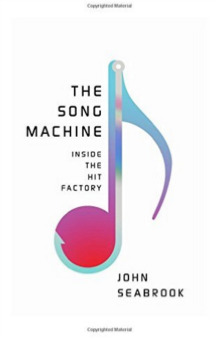I recently read The Song Machine: Inside The Hit Factory by John Seabrook. The quotes I found most interesting are below. If you like the quotes, click here to buy the book.
 “CDs spawned a generation of record executives whose skill was in putting together compilations of existing music rather than discovering new artists.” (25)
“CDs spawned a generation of record executives whose skill was in putting together compilations of existing music rather than discovering new artists.” (25)
Denniz PoP told a reporter, “It’s easy to say producing this music is equal to pushing a button in the studio. But that’s like saying writing a novel is a simple push of a button on your typewriter.” Denniz liked to say that no matter how technically adept you were at programming, sometimes you just had to “let art win.”” (32)
“Sweden had these farmers out there who were good at writing songs, but had no one to sing them. Songwriting was just a thing you did on your own when you were watching the cows, a kind of meditation. You didn’t focus as much on your ability as a performer as you did on the structure and craft of the songs. Which is really not the case in the US, where your charm and your voice and your powers as a performer come immediately into play.”” (38)
“A nation of songwriters endowed with melodic gifts, and who were meticulous about craft, but who were reluctant to perform their own songs, was a potential gold mine for a nation of wannabe pop stars who don’t write their own materials.” (38)
“Denniz once said, “It’s much more difficult to make it simple, especially achieving a simplicity without having it sound incredibly trivial.”” (39)
“Denniz put it, “A great pop song should be interesting, in some way. That means that certain people will hate it immediately and certain people will love it, but only as long as it isn’t boring and meaningless. Then it’s not a pop song any longer; then it’s something else. It’s just music.”” (39)
“Lyrics don’t need to mean anything much; the disco era had shown that. Lyrics that command too much attention are likely to kill the dancing.” (40)
“I think it was to our advantage that English was not our mother language,” Ekberg says, “because we are able to treat English very respectless, and just look for the word that sounded good with the melody.” Freed from making sense, the lyricists’ horizons are boundless.” (40)
“Cheiron studio needed an American act… not accidental stars with baggage, but lifers who would do whatever it takes to get to the top and stay there.” (46)
“At the beginning, the artists are regarded as mere hired hands by the writers and the producers, who are the real artists in the operation. But with success, the artists come to feel that they are, in fact, real artists – everything about the way they are sold to the world confirms it. They demand, at a minimum, more respect from their songwriters and producers, and they usually insist on more creative control over the songs. Some want to write their own material, often with disastrous results.” (68)
“They kept the labels’ names but little of their cool. The music business slowly changed from an art-house business run by men with ears into a corporate enterprise of quarterly earnings and timely results.” (116)
“Jimmy always says it’s all about the connection between the artist and the fans,” he says. “This whole business, it’s just about that connection.” (166)
“At the very least, that a pudgy guy with a goofy horse-riding dance (PSY’s Gangnam Style) could succeed where the most brilliantly engineered idol groups have not suggest that cultural technology can only get you so far. In the end, as Denniz PoP used to say, sometimes you have to let art win.” (167)
“Her main qualification as a singer was that she wanted to be one so badly. Rogers sensed that ambition ran deep – “I saw it in her eyes,” he says. But what was “it,” exactly? No mere girlish desire for fame; it was more likely a much more urgent need to escape from the anxieties of a violent home life into the illusion of security and boundless love that a life onstage seemed to offer. That desire, more than any inborn talent, is what fans will connect to, and that is what record men look for in a new artist. It’s the one thing they can’t manufacture.” (177)
“After appearing on several established rappers’ records, most notably Big Daddy Kane’s, Jay tried to get his own record deal, but the labels he approached, including Def Jam, turned him down. So he and his boys started their own label. They didn’t have a distribution deal; they sold their music out of the back of people’s cars in Brooklyn.” (181)
“All your instincts that make you successful, at some point in anyone’s life, those instincts will be wrong.” (235)
“Lenny Pickett says, “He has very good music skills, especially in the areas he needed to have them for producing music. Equally important, he had very good social skills, because if you don’t have those, doesn’t matter how good your tracks are, you’re going to end up being somebody’s helper.” (245)
“A fMRI study of people listening to music found that familiarity with a song reflexively causes emotional engagement; it doesn’t matter what you think of the song.” (303)
Kotecha says, “I always think in my head, if Max Martin was an American, he would have fizzled out a long time ago. He would have believed his own hype. But because he’s Swedish, he’s able to contain himself. He just focuses on being the best writer and producer and mentor he can be.” (306)
Liked the quotes? Buy the book here.

